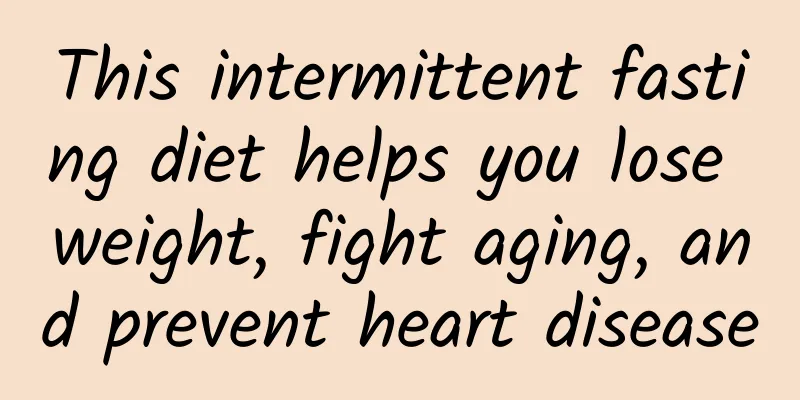This intermittent fasting diet helps you lose weight, fight aging, and prevent heart disease

|
It is really hard to imagine that the main killer of Taiwanese women's health is not gynecological cancer, but cardiovascular disease. In particular, the mortality rate of cardiovascular disease in women increases by nearly 100% every 5 years after menopause, which is really shocking! The killers that lead to heart attacks are high blood pressure and obesity. How to control heart disease is a key issue. According to a British study, people who adopt a "5:2 diet" can help reduce the risk of heart disease and diabetes. For every 5 years a woman ages after menopause, her cardiovascular disease mortality rate doubles According to statistics from the National Health Administration, in 2016, the number of women who died from cardiovascular diseases reached more than 23,800, higher than the more than 18,500 deaths from cancer. Especially after menopause, the mortality rate from cardiovascular disease doubles with every 5 years of age. It can be seen from this that it is urgent for women to prevent heart disease! Heart-healthy diet goes beyond nuts: Study: 5:2 diet also effective When it comes to a heart-protective diet to prevent heart disease, the general impression is eating nuts, including walnuts, almonds, hazelnuts, cashews, pistachios, pecans and peanuts. According to a study published by Harvard University, eating a palm-sized amount of nuts several times a week can reduce the risk of heart disease. In addition to nuts, according to the Mail Daily, a recent study by scientists from the University of Surrey in the UK found that the "5:2 diet" can also help reduce the risk of heart disease and diabetes. What is the 5:2 Diet? This is an intermittent fasting method that originated in the UK and is now becoming popular in the United States and Europe. The 5:2 diet means reducing calorie intake for two days a week. It includes eating normally for five days a week, and then strictly limiting daily calorie intake to 600 calories by drinking only soup and milkshakes for two days a week. In other words, you can eat normally for the other five "relaxation days" to reduce the risk of heart disease. Study: People who follow a 5:2 diet may have a lower risk of cardiovascular disease Researchers found that people who followed the 5:2 diet cleared harmful fats from their blood more quickly after meals than those who followed a calorie-restricted diet. This has long-term benefits for the heart and can reduce the risk of cardiovascular disease. The scientists published their findings in the British Journal of Nutrition. The researchers tracked the diets of 15 overweight people and compared them with 12 overweight people who followed a normal calorie-counting diet, with women restricted to 1,400 calories a day and men to 1,900 calories. The groups were followed until they lost 5 percent of their body weight. During the study, it was found that the 5:2 group was faster, taking an average of 59 days, while the calorie counting group took an average of 73 days. Importantly, the 5:2 diet group was significantly healthier after completing the diet. Scientists at the University of Surrey also carried out blood tests on the subjects at the beginning and end of the trial, which showed that they had much lower levels of triglycerides in their blood after eating. Their blood pressure also dropped by 9% during the trial. Additionally, the 5:2 diet group also showed signs of better insulin production, which helps blood sugar be absorbed. The key to a successful diet is to be able to maintain it for a long time Researcher Dr Rona Antoni said: "As seen in this study, some participants struggled to stick to the 5:2 diet, but this approach is not for everyone and ultimately the key to dieting success is finding an approach that can be maintained in the long term. For those who behave well and are able to stick to the 5:2 diet, this may reduce some of the risk effects on cardiovascular disease. [5:2 diet has these benefits]: The 5:2 diet is a type of light fasting that is flexible and allows you to choose and plan a fasting time that suits you based on your work and time. This type of intermittent fasting not only helps reduce the risk of heart disease, but also helps with weight loss and improves health in all aspects, including: blood sugar, blood pressure, cholesterol and other health indicators, and helps with youth and anti-aging. However, it is important to note that this is not suitable for everyone and it is best to consult a nutritionist first. |
<<: Is it that difficult to lose weight? Nutrition experts: 7 misconceptions that hinder weight loss
>>: "Sour cabbage" is a good stomach and intestines dish that will make you drool.
Recommend
Can you get pregnant again after a molar pregnancy?
It is possible to get pregnant again after a hyda...
Weight stagnant and can’t lose weight? Eating this way can improve your metabolism (Part 2)
Basically, from the beginning of weight loss to t...
Pre-abortion examinations are very helpful for women
If an unexpected pregnancy is discovered, painles...
Common methods for regulating irregular menstruation
What are the main common methods for regulating i...
How to treat female patients with cervical erosion? Introduction to the treatment methods of female cervical erosion
Under normal circumstances, the treatment of fema...
So what if I’m single! He is happy and fat, I lose weight, 3 kinds of slimming meals make you more beautiful
1111 Singles’ Day is here again! Every time this ...
What causes pelvic inflammatory disease?
Pelvic inflammatory disease is a common gynecolog...
What anti-inflammatory drugs should be taken for pelvic inflammatory disease and adnexitis? What are the symptoms?
Pelvic inflammatory disease (PID) is a gynecologi...
The harm that bacterial vaginosis can cause to women
Are you still worried about how to treat bacteria...
Why do women need to undergo B-ultrasound examination before abortion? What should women pay attention to after abortion?
In life, many women will have an artificial abort...
When can I have sex after uterine fibroid surgery?
Regarding the question of having sex after surger...
Patients with cervical hypertrophy should undergo examination as soon as possible
Cervical hypertrophy is a common gynecological di...
Is prediabetes reversible? Nutritionist Chen Yichun: 3 tips to help people with prediabetes control blood sugar
According to a survey conducted by the National H...
Yogurt weight loss method 3+1 recipe revealed
The yogurt weight loss method can unclog our inte...
After a heavy meal during the Chinese New Year, it is a good time to replenish your fiber intake with fruits and vegetables
During the New Year holidays and long holidays, w...









